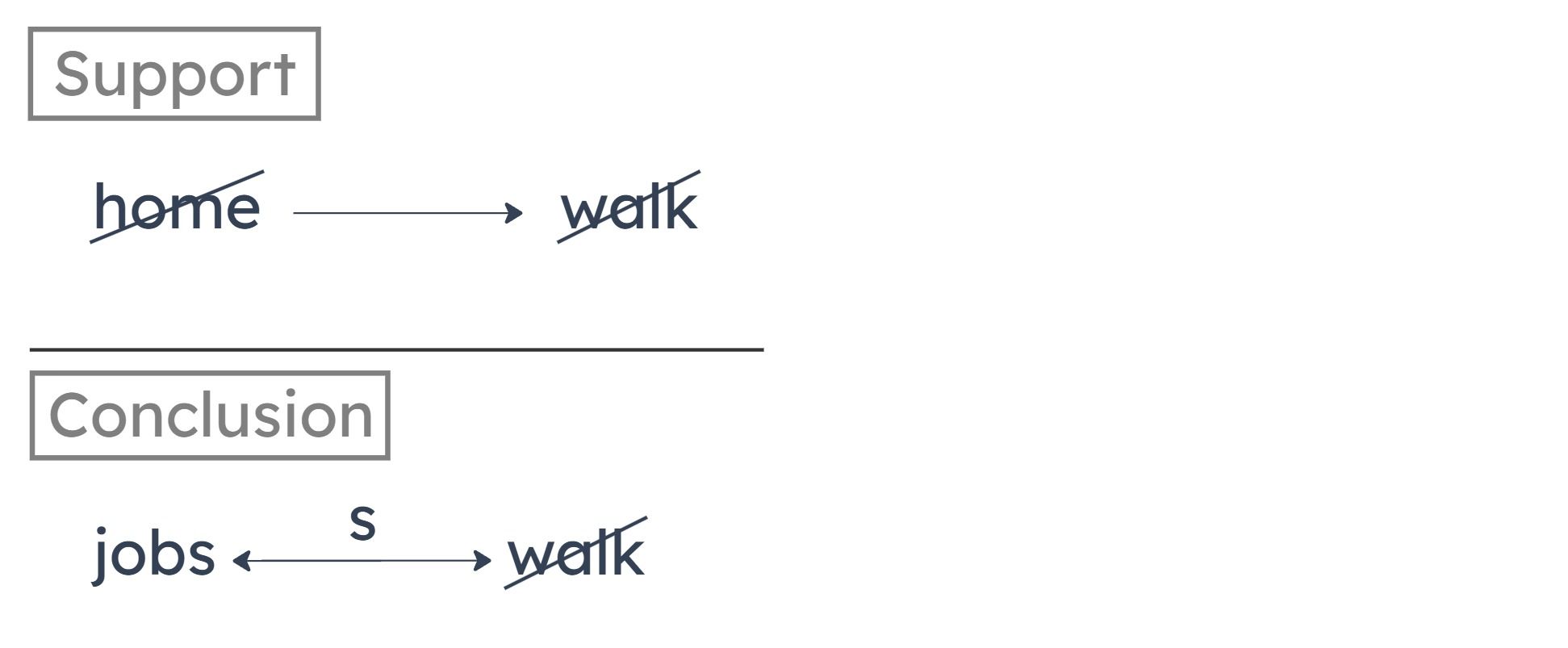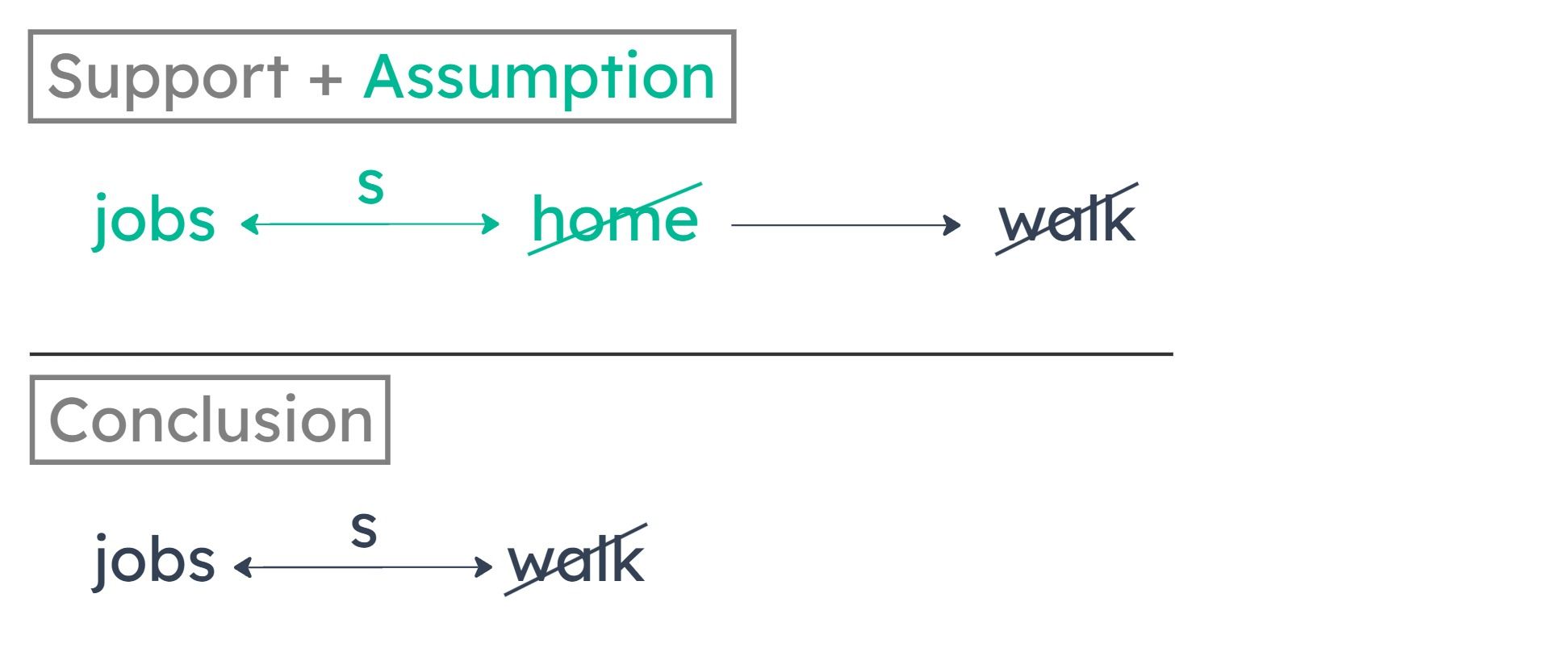LSAT 101 – Section 3 – Question 19
LSAT 101 - Section 3 - Question 19
December 1997You need a full course to see this video. Enroll now and get started in less than a minute.
Target time: 1:30
This is question data from the 7Sage LSAT Scorer. You can score your LSATs, track your results, and analyze your performance with pretty charts and vital statistics - all with a Free Account ← sign up in less than 10 seconds
| Question QuickView |
Type | Tags | Answer Choices |
Curve | Question Difficulty |
Psg/Game/S Difficulty |
Explanation |
|---|---|---|---|---|---|---|---|
| PT101 S3 Q19 |
+LR
| Sufficient assumption +SA Conditional Reasoning +CondR Link Assumption +LinkA | A
8%
164
B
2%
162
C
7%
165
D
83%
168
E
2%
158
|
132 146 160 |
+Medium | 146.901 +SubsectionMedium |
J.Y.’s explanation
You need a full course to see this video. Enroll now and get started in less than a minute.
Summary
The author concludes that some students with part-time jobs do not walk to school. His reasoning is that every student who walks to school goes home for lunch. Or, in contrapositive form, that all students who don’t go home for lunch don’t walk to school.


Missing Connection
The conclusion is about students with part-time jobs, but they aren’t mentioned in the premise. We need to bridge this gap to reach the conclusion that some students with part-time jobs do not walk to school.
By taking the contrapositive of the premise, we inferred that all students who don’t go home for lunch don’t walk to school. So, if at least some students with part-time jobs don’t go home for lunch, then some of them wouldn’t walk to school. This would guarantee the argument’s conclusion.
By taking the contrapositive of the premise, we inferred that all students who don’t go home for lunch don’t walk to school. So, if at least some students with part-time jobs don’t go home for lunch, then some of them wouldn’t walk to school. This would guarantee the argument’s conclusion.
A
Some students who do not have part-time jobs go home for lunch.
This can’t be correct, because it tells us about some students who don’t have part-time jobs. Our conclusion is about students who do have part-time jobs. A “some” statement’s contrapositive isn’t automatically valid. So this tells us nothing about students with part-time jobs.
B
Every student who goes home for lunch has a part-time job.
This doesn’t help us reach our conclusion, because all it lets us infer is that some students with part-time jobs go home for lunch. We want to conclude that some students with part-time jobs do not walk to school.
C
Some students who do not have part-time jobs do not go home for lunch.
This can’t be correct, because it tells us about some students who don’t have part-time jobs. Our conclusion is about students who do have part-time jobs. A “some” statement’s contrapositive isn’t automatically valid. So this tells us nothing about students with part-time jobs.
D
Some students who do not go home for lunch have part-time jobs.
Every student who doesn’t go home for lunch doesn’t walk to school. So, if some students with part-time jobs don’t go home for lunch, some students with part-time jobs don’t walk to school. Note that “some” is bidirectional: saying some As are Bs is equivalent to saying that some Bs are As.


E
Every student who goes home for lunch walks to school.
This doesn’t mention students with part-time jobs, so it can’t be correct. We need an answer that bridges the gap between the premise and the conclusion.
Take PrepTest
Review Results
LSAT PrepTest 101 Explanations
Section 1 - Reading Comprehension
- Passage 1 – Passage
- Passage 1 – Questions
- Passage 2 – Passage
- Passage 2 – Questions
- Passage 3 – Passage
- Passage 3 – Questions
- Passage 4 – Passage
- Passage 4 – Questions
Section 2 - Logical Reasoning
- Question 01
- Question 02
- Question 03
- Question 04
- Question 05
- Question 06
- Question 07
- Question 08
- Question 09
- Question 10
- Question 11
- Question 12
- Question 13
- Question 14
- Question 15
- Question 16
- Question 17
- Question 18
- Question 19
- Question 20
- Question 21
- Question 22
- Question 23
- Question 24
- Question 25
Section 3 - Logical Reasoning
- Question 01
- Question 02
- Question 03
- Question 04
- Question 05
- Question 06
- Question 07
- Question 08
- Question 09
- Question 10
- Question 11
- Question 12
- Question 13
- Question 14
- Question 15
- Question 16
- Question 17
- Question 18
- Question 19
- Question 20
- Question 21
- Question 22
- Question 23
- Question 24
- Question 25
- Question 26
Leave a Reply
You must be logged in to post a comment. You can get a free account here.